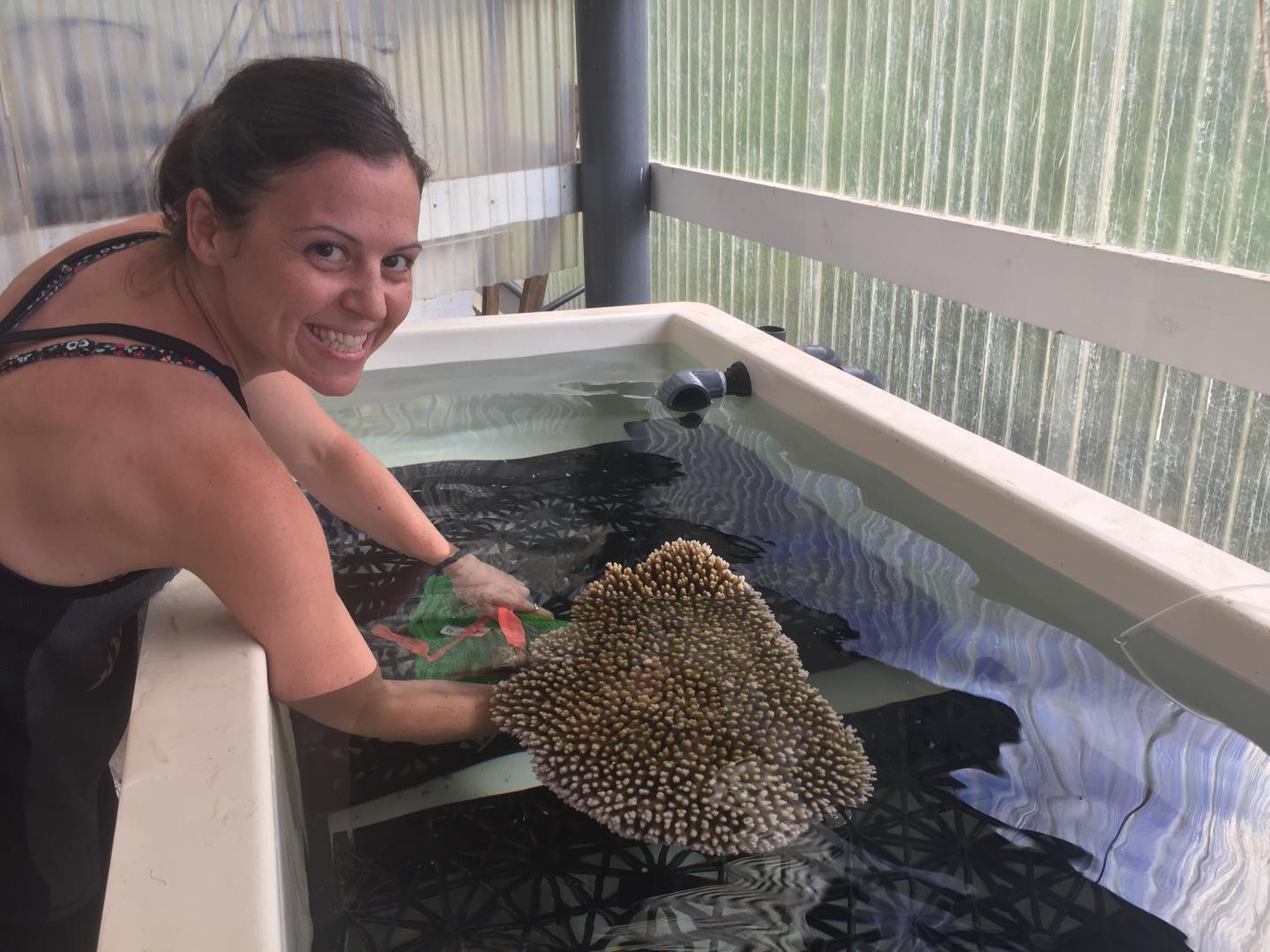University partners with four institutions as part of National Science Foundation Big Idea program to study coral reef evolution, adaptation

Credit: Hollie Putnam
KINGSTON, R.I. – July 24, 2019 – The University of Rhode Island is leading a team that has been awarded a $3 million 5-year collaborative research grant from the National Science Foundation as part of its investment in 10 Big Ideas to serve the nation’s future. Funded through NSF’s Understanding the Rules of Life: Epigenetics program, researchers will work to better understand how changes in nutrition and energy through symbiosis can influence epigenetic changes in corals, and what it may mean for coral ecology.
Epigenetics is the study of changes in organisms caused by a modification of gene expression -or the way gene instructions are interpreted- as opposed to modification of the genetic code.
Coral reefs are essential to life on this planet as they play a critical role in carbon cycling, coastal protection, biopharmaceuticals, and economics through tourism and fisheries. The entire ecosystem is based on the symbiosis between corals and algae, or single-celled plants, which live inside them, photosynthesize, and generate the energy the reef needs to grow and reproduce.
“Corals are the canary in the coal mine when it comes to climate change, and are valued in the order of hundreds of billions of dollars annually. Better understanding their evolutionary processes and how they may acclimate through epigenetics may allow us to reduce the negative effects of events like mass bleaching and the impact the rapid loss of coral reefs has on our food security, coastal security and how the oceans impact our coasts,” said research team leader Hollie Putnam, coral biologist and assistant professor of biological sciences at the University of Rhode Island.
The project is being led by the University of Rhode Island’s College of the Environment and Life Sciences, in collaboration with researchers at the University of Washington, Florida International University, the University of California Santa Barbara and Shedd Aquarium in Chicago. It will be developed in Mo’orea, French Polynesia and will test how changes in the nutritional state of symbiosis may change epigenetic patterns to allow corals to acclimate within and across generations.
“Corals are also a nice model to study because they are symbiotic – as are most organisms and systems on the planet – so what we learn here will help us to understand all biological systems better,” added Putnam.
A rapidly developing field, epigenetics is bringing to light the capacity for genetic materials to generate many different outcomes when interacting with the environment. Studies on the impact of stress and famine during pregnancy have shown that nutrition and epigenetics can interact to have significant consequences for many generations.
“Epigenetics constitutes an exciting frontier to understand how living beings interact with their environment,” said Jose Eirin-Lopez, molecular biologist and environmental genetics expert and assistant professor of biological sciences at Florida International University. “Present in all eukaryotes from simple yeast cells to human beings, epigenetic modifications ‘sense’ environmental cues that shape how our genome works, governing fundamental processes that go from our inception to our development, from aging to health, and from our social interactions to our evolution as a species.”
Over the next five years, the research team will conduct experiments on the coral reefs of Mo’orea to develop and expand new theoretical modeling approaches to piece together the complex interactions that result in organism function, ecological performance, and evolution. The project will add to the ongoing Mo’orea Coral Reef Long Term Ecological Research project, which has collected 15 years of data on the structure and function of Mo’orea’s coral reefs at a time when the world’s coral reefs are facing numerous threats.
“This will provide us amazing insights into the function of Mo’orea’s coral reefs at a critical time. And with this detailed understanding, we’ll be better equipped to understand reefs elsewhere,” stated Holly Moeller, symbiosis and modeling expert and assistant professor of ecology, evolution and marine biology at the University of California Santa Barbara, referencing the use of this knowledge to build predictive models for coral reef ecology and evolution.
Theoretical modeling efforts will be essential to this approach. The group will connect energy metabolism at the cellular scale to epigenetic, physiological, and ecological factors through the use of Dynamic Energy Budget models pioneered by team member Roger Nisbet, of ecology, evolution and marine biology at the University of California Santa Barbara.
“By using this symbiotic system we can better understand how both the environment and interactions with other organisms influence these basic Rules of Life,” says Ross Cunning, research biologist and symbiosis expert at the Shedd Aquarium.
These Rules of Life can then be translated across systems due to the common nature of symbiosis with living things. Ultimately, the major pioneering outcome of this work will be delineating fundamental links between universal organismal energetic processes and ecological and evolutionary outcomes driven by epigenetics.
The unique research team blends expertise in cellular biology, molecular biology, physiology, ecology and mathematics. It will include undergraduate and graduate students from each university, as well as postdoctoral scholars. They will work within their institutions and together to integrate their findings.
“This Big Idea research provides a unique opportunity to train the next generation of scientists in a quantitative, multidisciplinary fashion,” said Steven Roberts, associate professor of aquatic and fishery sciences at the University of Washington.
###
Media Contact
Dawn Bergantino
[email protected]
Original Source
https:/




